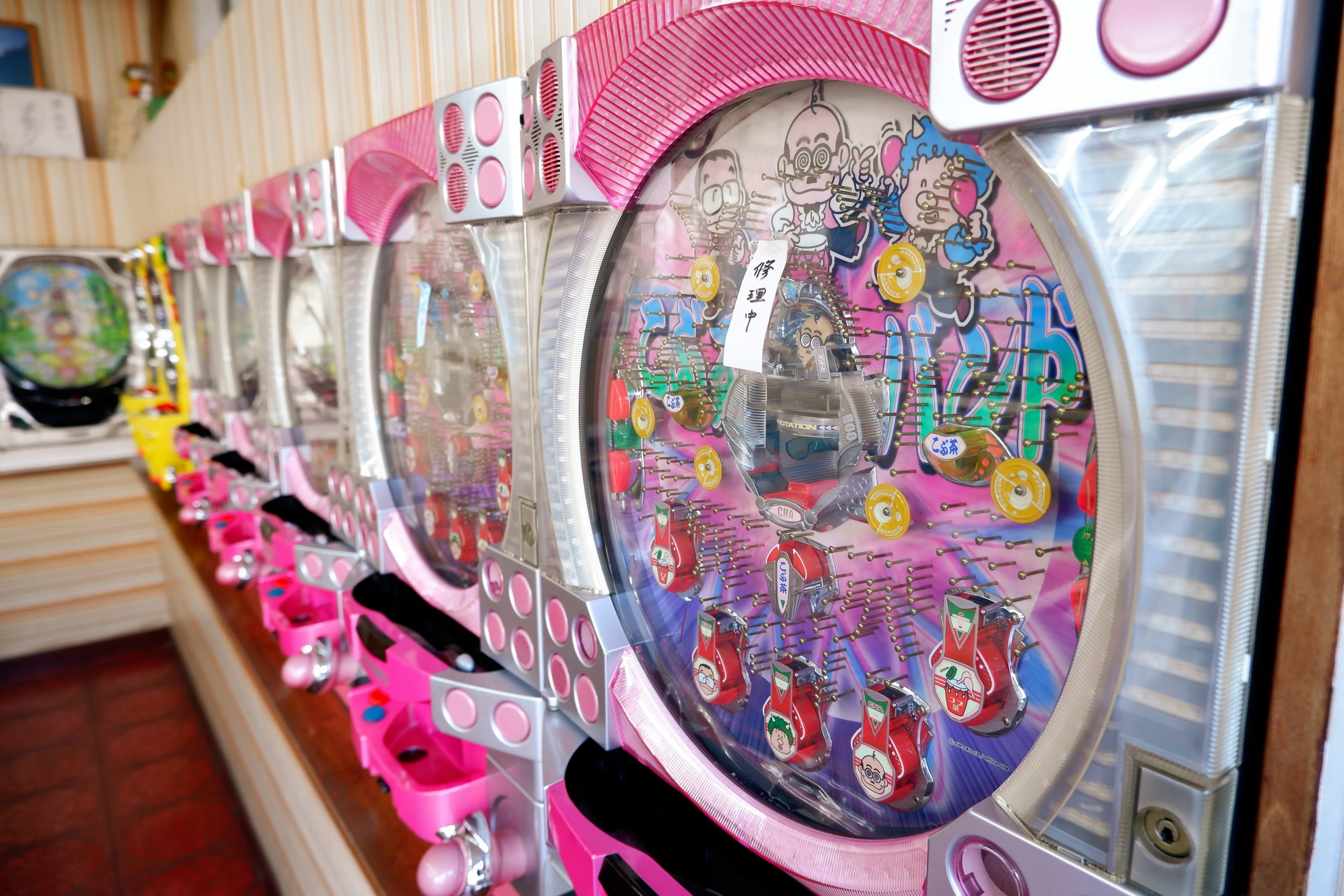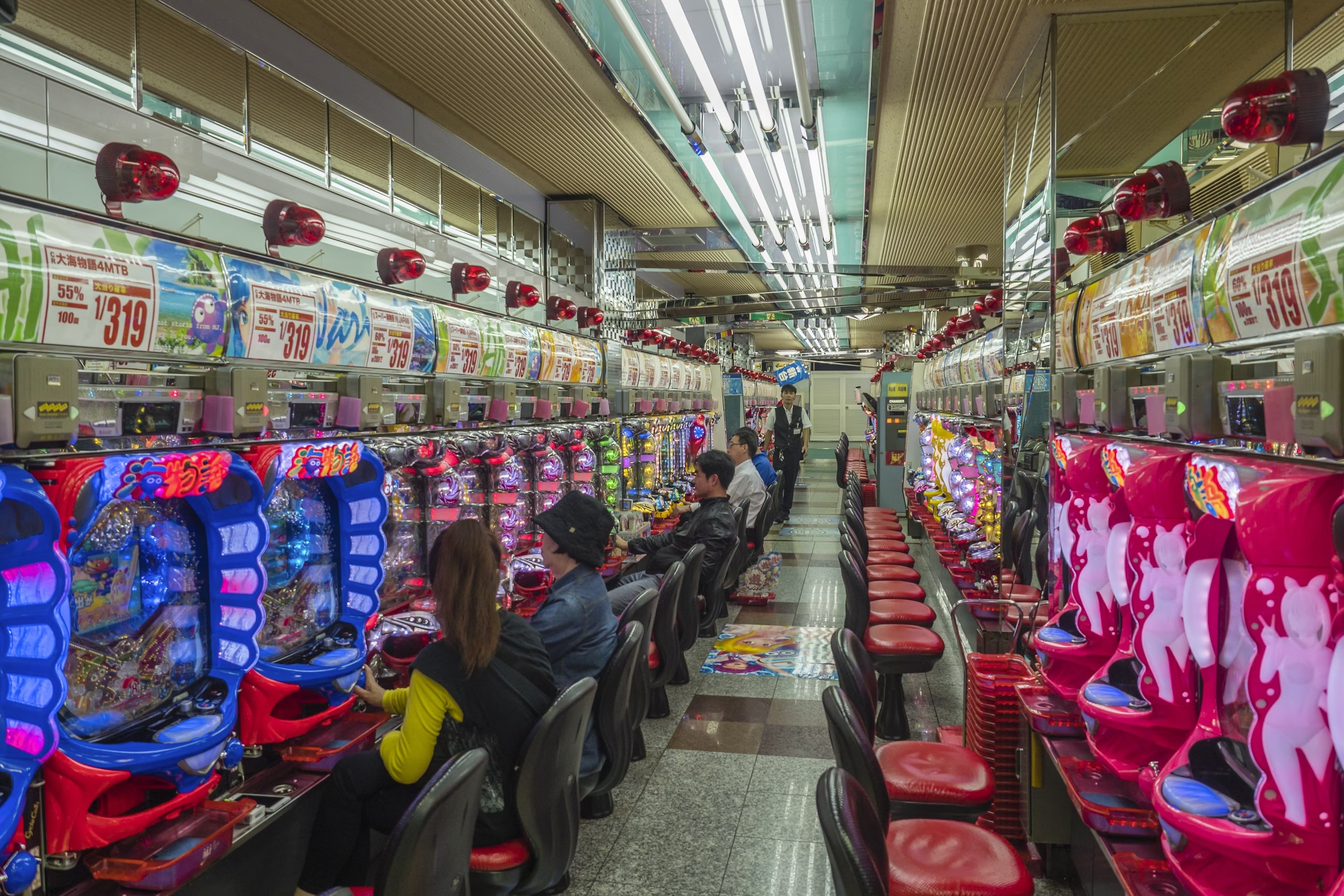A Journey into Japan’s Pachinko Parlors

When I first stepped into a pachinko parlor in Tokyo, it felt like I was entering a new world.
A heavy smell lingered over the place while light wisps of cigarette smoke drifted in the air despite Japan’s strict public health policies. The clanging sounds of thousands of steel pachinko balls clattered around me, mixing with the electronic cheers and electric lights of the machines to create a rhythm that was equally exhilarating and disorienting. A huge space spanning multiple levels with rows upon rows of machines, it was hard not to be impressed by the mass of players with their eyes either fixed on the movement of the games in front of them or inserting metal balls to start the next round. It felt almost as if time slowed down in these parlors – with the hour or two I spent playing seeming to pass in as quickly as fifteen minutes. Open late into the night and located in cities all over Japan, pachinko arcades truly offer an addictive experience of sensory overload.
From first inspection, these pachinko parlors seem to be Japan's answer to the United States' Las Vegas. Yet, casino-style gambling was outlawed in Japan until last year, and the country's first casino is not set to open until 2029. After being so quickly entranced by the chaos of Japanese pachinkos, I couldn't help but wonder: in a country where formal gambling is so highly regulated, how did pachinko become so popular?

What is Pachinko?
The best way to describe pachinko is that it combines the core elements of pinball and a slot machine. Players purchase small steel balls that are inserted into the machine. After shooting these balls with a flipper, the goal is to land in special pockets which reward the player with balls depending on the difficulty level. The more balls won, the more tokens that a player receives which can later be traded in and exchanged for cash or valuable items at separate, third-party shops nearby.
Since the 1930s, pachinko has been a widely popular game in Japan. The game peaked in popularity during the 1990s with nearly 17,000 pachinko parlors and 30 million annual domestic visitors. While only around 8,500 parlors remain in Japan today, the economic impact of pachinko gaming remains significant. Overall, the industry is estimated to generate around $200 billion annually, surpassing the economic returns of the Japanese automobile manufacturing industry and making 30 times more than the yearly gambling revenue of Las Vegas.
Pachinko players are overwhelmingly male with many now being middle-aged or older men who grew up during pachinko’s peak era. Addictive in nature due to its similarity to slot machines, the allure of pachinko exists in the continuous thrill of a potential win. In 2017, a survey revealed that around 3.6% of the population (or 3.2 million people) in Japan struggled with gambling addiction despite the country’s prohibitive laws, and many named pachinko as a significant contributor to their addiction. Yet playing pachinko isn’t always about money or gambling. As I observed in the groups of smiling, laughing people around me, pachinko parlors also act as a familiar social space that offers a sense of nostalgic enjoyment within a loud and immersive world. Still, cultural perceptions of pachinko parlors are often highly negative in Japan with stories of gambling addiction and crippling debts creating broad social concerns.

The (Il)Legality of Pachinkos
With most forms of gambling illegal in Japan, pachinko parlors cleverly navigate around governmental restrictions as they exist within a legal grey area due to their strategically designed system of ball-to-token exchanges. As pachinko parlors don’t provide cash payouts to patrons within the walls of the arcade, they are not classified as gambling establishments. However, the game clearly shares enough similarities to gambling that it has not been able to avoid government scrutiny and regulation. In recent years, tighter restrictions on pachinko parlors have been put in place, particularly the 2018 rules introducing limits on how many balls can be won during individual gameplays to prevent massive wins that could encourage addictive gambling behaviors. Pachinko parlors are also routinely inspected to ensure full accordance with these laws and face heavy fines or forced closure if found non-compliant.
However, many argue that these measures to reduce pachinko’s connection to gambling and addiction have not been effective enough. While less prevalent today, pachinko continues to carry historical links to organized crime and the Yakuza, Japan’s notorious mob-like criminal organization that utilized these parlors for money laundering and other illegal activities. While these criminal ties have been reduced in recent years due to increased governmental oversight, these negative associations have contributed to the game's waning prevalence and pachinko's controversial place in Japanese society.
Over the last three decades, pachinko has witnessed a significant decline in popularity due to stricter regulations, concerned public attitudes, and the changing tastes of younger internet-driven generations. Furthermore, Japan officially legalized casinos in 2023 and has set the country’s first-ever casino-resort to open in Osaka by 2029, leaving pachinko’s position within Japanese society highly vulnerable. Though Japan has long resisted instituting legalized gambling, this shift in policy is expected to introduce more transparent, regulated gambling that will appeal to both Japanese citizens and international tourists. With this increased competition, stricter governmental oversight, and already dwindling public appeal, this leaves the future of pachinko parlors, like the game itself, highly uncertain.
A Future Unknown
As I left that first arcade feeling exhilarated and overwhelmed by the non-stop gameplay, I finally understood the enchanting appeal of the pachinko. However, for the first time, I could also truly comprehend the societal concerns and controversy that permeate this industry. Pachinko parlors seem to be standing at a cultural crossroads in Japan and their survival is far from guaranteed. Still, the pachinko will continue to serve as a unique symbol of excitement and controversy within Japanese gaming and gambling culture – even if one day it's only in history books.





